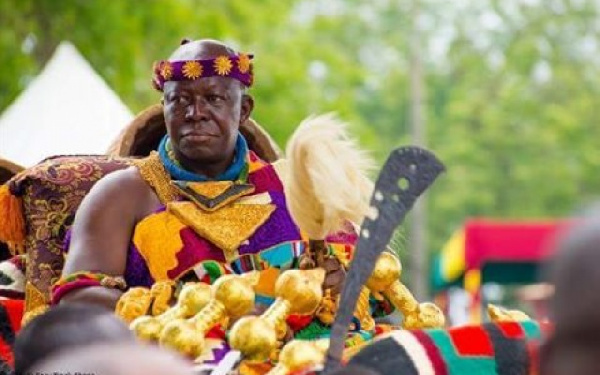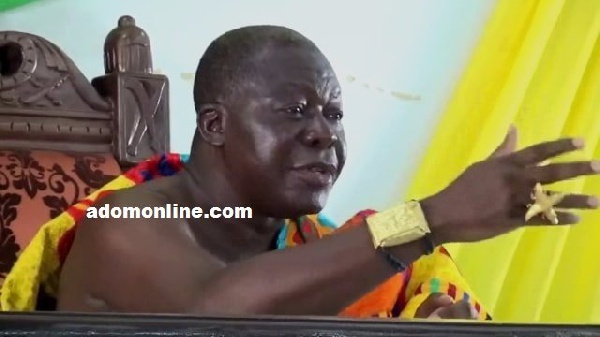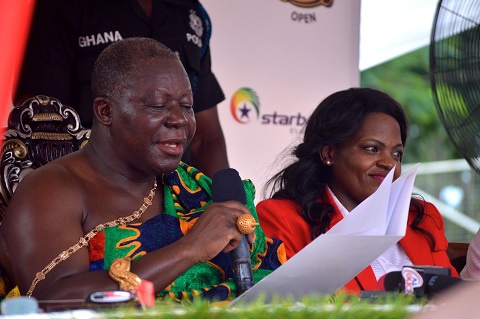Opinions of Tuesday, 16 April 2019
Columnist: Dr. Wereko-Brobby
Dr. Wereko-Brobby writes...The ruler and the Monarch
This is my Contribution to the Otumfuo@20 Celebrations. It is an Opinion Piece I penned 20 years ago after the newly crowned Asantehene’s inaugural visit to the Osu Castle to meet President Jerry John Rawlings
The President of Ghana, Flt. Lt. Jerry John Rawlings, had his first meeting with the Asantehene, Otumfuo Osei Tutu II and the Asanteman Council last Friday at the Castle, OSU. It was a historic occasion by every imaginable measure. The meeting was also a singular opportunity to set the tone for how the two most powerful people in Ghana intended to work together to push our country forward in the next century.
Unfortunately, Instead of the meeting being seen as the springboard for a united cause, the meeting has become the focus of intense public disquiet and displeasure. The ironic thing is that many of those who feel most offended are non-Asantes whose cause the President sought to give the impression he was fighting for.
There was and can never be any tangible or legitimate excuse for the manner in which the President treated the Asantehene and his entourage. It is conceivable that the meeting went far better than the picture of it presented to the nation. Be as it may, what we have is what we saw on GTV and there is no doubt that the whole thing left a very sore taste in the mouths of most Ghanaians, Asantes and others.
If the Presidents behaviour was calculated to snob and humiliate the Asantehene, it could have been further off target. Rather what came out of the exchanges was an impression of a spoilt and uncouth bully trying to establish his superiority over a much more cultured colleague through the exercise of sheer brute power.
All of us Ghanaians have developed a genuine fondness and respect for our traditional authorities. As with all human institutions, we have been irritated with some of its more negative aspects, especially the interminable squabbles over Chieftaincy succession and land disputes. We have been sometimes upset about some aspects of our traditions which we see as holding us back from the march of modernity and progress. Notwithstanding the little irritations, we have come to recognise that our traditional authorities and the customs and traditions that they guard are indeed essential to the cohesive growth and development of our country.

Our traditional rulers may exercise little or no legally enforceable powers under modern constitutional rules of governance However, that is far from saying that they have no powers or influence whatsoever within their domain. At crucial times, if choices have to be made, most Ghanaians will more readily accept the authority of their Chief over that exercised by the civil authority, no matter the legal powers of the civil power. In other words, Jerry John Rawlings is the President of Ghana and holds all the Executive powers of Ghana under the Constitution. However, when he precipitates an unnecessary showdown as he tried to do with the Asantehene and Asantes, or indeed any of the country’s ethnic authorities, last Friday,
He must appreciate that he would come off second best every time, without exception.
I am not sure what was eating up our President last Friday. However, there is absolutely no question that he was ready for a fight with the Asantehene. For someone who never stops burning our ears about the iniquitous treatment, we have received at the hands of the white man, the President’s welcome of the Asantehene was completely unacceptable. Gone was the normal boyish, I am so over-awed sheepish grin that greets clapped-out pop stars or some nerd who comes to donate a toy plane to the President’s collection. What we saw was very brusque per functionary handshake often reserved for enemies or opponents who you are required to greet at the start of a duel. It was bad manners and nothing else.
The President’s incessant wagging of his fingers at the Asantehene and his Chiefs and the manner in which he addressed them was absolutely a disgrace. The one thing all Ghanaians are taught is to show decorum and respect to our Chiefs, no matter or own standing. Indeed, it is precisely because we wish to avoid offending our Chiefs that we are offered the cushion of talking to them through the Akyeame. In this case, the protocol was understandably waived. However, the President was not absolved of the need to behave in a polite and dignified manner. There was no need for him to try to belittle the Asantehene and his entourage by pointing his fingers at them and addressing them as “You”, instead of “Nananom”. If he had, he would have lost nothing of his power, but rather gained a lot more respect from the people of Ghana.
Given the incessant acrimony and strife which have dogged Chieftaincy issues in Ghana, the President should have taken the opportunity to add his voice and stature to the many public commendations of the very orderly and peaceful manner in which Otumfuo Osei Tutu II succeeded his brother Otumfuo Opoku Ware II as the 16th occupant of the Golden Stool. Rather, the President used the excuse of supposedly unfair media coverage of the succession, to attempt to berate the Asanteman Council and drive an artificial wedge between Otumfuo Osei Tutu II and Nana Akwasi Agyeman. This was as unfortunate as it was unpardonable since it created the impression that the President was unhappy about both the peaceful manner of the process as well as the outcome of the succession to the Golden Stool.
There is no doubt that the President would have preferred a different outcome to the succession. That it did not happen is history and what he ought to do is to accept the outcome as everybody else has done. Instead of doing so, the President has sought to undermine the new Asantehene by creating mischief and confusion. For example, I am aware of the fact that the Ashanti Regional Commander of the Ghana Police was hauled before the Inspector General of Police to explain why he had done the decent thing of going to congratulate Otumfuo Osei Tutu II. I am also aware of the fact that the King of Swaziland was prevented from going to see the Asantehene when he was here recently for the African -American summit, even though he had expressly wished to do so and elaborate arrangements had been made.
Asking the Asante Chiefs to condemn the media was over particular incidents not a very clever move at all. Perhaps the President was the President was right to express concern about the potential invitation to disorder arising out of the uncouth and uncivilised action of a single caller to a radio station. But that incident cannot be used as the excuse to scold the Asante Chiefs for not acting or even to give an impression that their silence somehow meant endorsement of the person’s sentiments. It is important to point out that the FM stations of Accra do not reach Kumasi and much of the Asante nation and therefore Asantehene and his Chiefs probably did not hear or know of the incident the President referred to.

The suggestion that one individual with an Asante name gives the excuse to damn a whole people is quite silly and hollow. I know of a fellow called Asamoah who is a member of the President Rawlings inner cabinet. His mother is an Asante from Juaben, though he prefers to call himself and Ewe from Likpe. No matter his preference, the name Asamoah is as Asante as they come. There are many thousands of people of different ethnic groups who use ‘Asante- sounding’ names but are not Asantes. So, it does really beg the question of whether or not the President had not already formed a judgement on the matter.
If Nana Akwasi Agyeman’s chances for becoming Asantehene evaporated over the past twenty years, it happened precisely because of what happened to him under the governance of President Rawlings. It is stretching the bounds of credulity somewhat for the President to berate the Asanteman Council for not taking on the media for lampooning an incident whose humiliating intent and antecedence was the work of the President’s own PNDC regime.
It was the PNDC which did everything possible to humiliate and disgrace Nana Akwasi Agyeman in the heady days of the ‘revolution that failed to stop the decay’. In those days, it was deemed as ‘being brought down to earth” to be made to carry latrine pans on your head. So, if the press lampoons Nana Akwasi when he wants to be King, why should the person who humiliated him suddenly be full of BIG, BIG Crocodile tears ?. Please, Jerry, spare us the stagecraft, we have seen the show too many times already.
The Asantes have an enviable record of living peacefully and in harmony with people of other ethnic origins. Therefore, the attempt by the President and his people to lay charges of arrogance and introversion against Asantes has absolutely no merits whatsoever. Asante has been and remains the most ethnically diverse and peaceful entity within Ghana. Kumasi is the most cosmopolitan city in Ghana, with massive settlements of people of all of the country’s major ethnic groups, most of whom are as proud of their Asante association as the indigenes themselves.

Two of the President’s advisors who spoke at the meeting, namely Faustina Nelson and Kwamena Ahwoi, are respected citizens of Kumasi who are no doubt very proud of their links with the city. Indeed, one could not help but notice their respectful countenance when they addressed the Asantehene and his Council, even though they were not being exactly charitable or praise -singing.
It is futile and indeed reprehensible to seek to create animosity towards and disenchantment with the Asantes on the basis of spurious isolated incidents. The Asante Kingdom’s place in the history of Ghana cannot be wished away or re-written by anybody. Neither can the esteem and worldwide respect for the Asantehene and the rich culture and traditions of the Asantes be diminished or tarnished by actions that border on unsubtle attempts to flaunt and show where power really lies. As has been demonstrated time and again, political power may coerce people into falling in line. However, the more enduring power is the one that emanates from the willing and voluntary subjugation of a people to the authority of their Monarch.
Whether one likes it or not, the world recognises the 300-year-old Asante Kingdom as one of the great and enduring powers of our times. That recognition endures today even though the Kingdom has little or no legal authority. However, there is a continuing fascination with the richness of the culture and traditions which Asante spawned and has retained over the years. If anybody needed proof of the enduring influence and global recognition of Asante and the occupant of the Golden Stool, this was amply demonstrated by the immense international interest shown over the death of Otumfuo Opoku Ware II and the succession of Otumfuo Osei Tutu II.
The death of Otumfuo Opoku Ware II was carried by just about every major newspaper in the world. From the Wall Street Journal to the New York Times, the Times of London, The Melbourne Age, etc. Fulsome obituaries were carried on the late Otumfuo and the Kingdom of Asante. The funeral rites were covered by many of the international news agencies.
Last but not least, the installation of Otumfuo Osei Tutu was similarly given the full global news treatment. I do not wish to encounter anybody’s ire by pointing out that the very many inaugurations of the Executive authority have not even merited a single line of news on any of the major news organisations.

On the occasion of the installation of Otumfuo Osei Tutu II, the BBC produced a documentary on the successful co-existence between modernity and tradition in the present Asante Kingdom. It featured the Juabenhene, Nana Otuo Siriboe as the epitome of a modern successful traditional ruler and businessman who incidentally was also the head of the planning committee for the installation.
The programme, which is probably the best unpaid advert for Ghana’s tourism drive ended with the most perceptive and endearing statement that: “In Ghana, the elected government rules and the Asantehene reigns”. This was an elegant summing up of the reality on the ground that political power may coerce people into falling in line. However, the more enduring power is the one that emanates from the willing and voluntary subjugation of a people to the authority of their Monarch.
Whatever riches Asante has preserved to this day are there for all of Ghanaians to enjoy and profit from for the country’s sustained development. President Jerry John Rawlings will do well to remember he cannot undo that which three hundred years of glorious history have nurtured and enriched. Thirty minutes of contrived and uncouth television will not give him a greater place in our esteem or history than the Asantehene or the Asante nation. If he is smart, he will build on the Asante legacy to make Ghana, which now includes most of the old Asante, a great modern nation.











